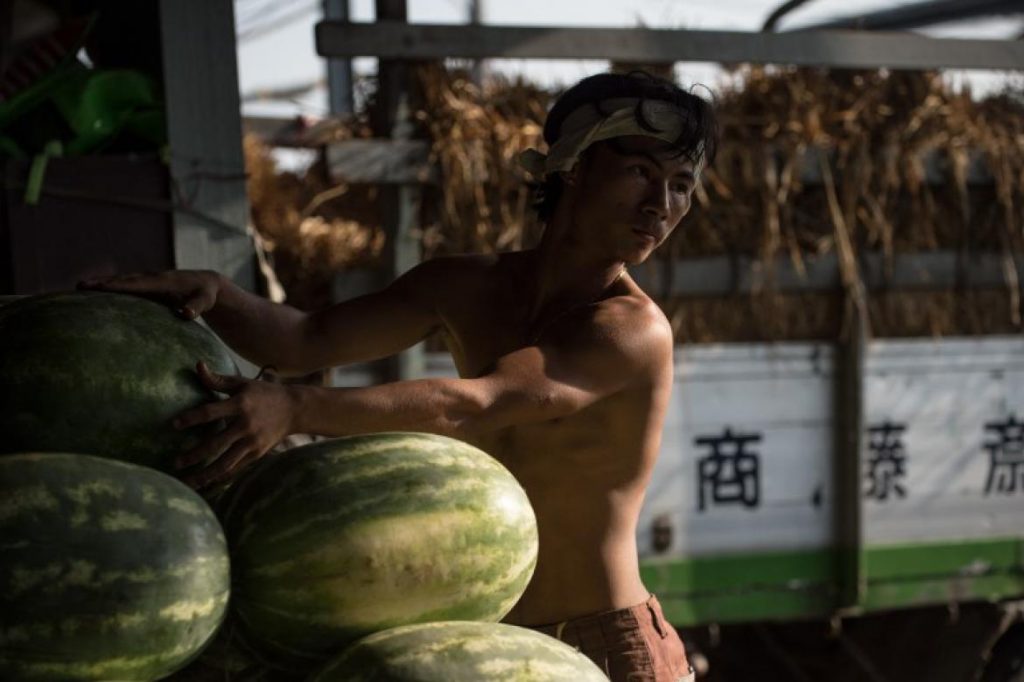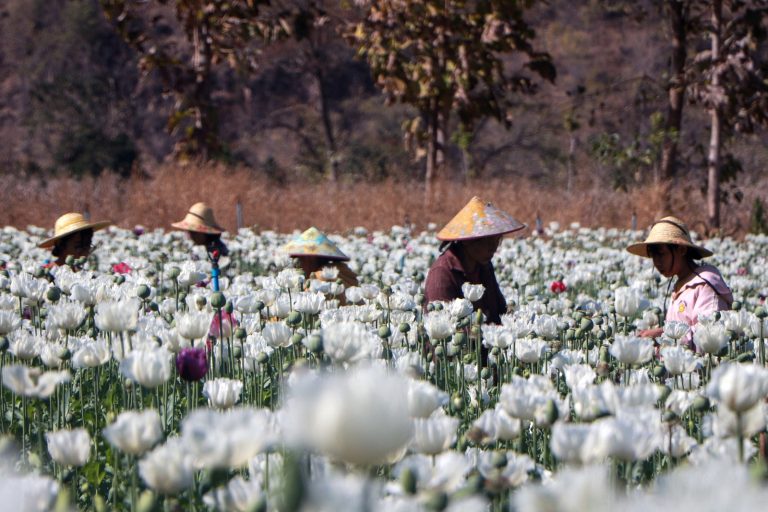The closure of a border crossing caused huge losses from rotting fruit and has some wondering how long it will be before the government’s gives priority to the economy.
By SITHU AUNG MYINT | FRONTIER
DISGRUNTLED farmers held an unusual demonstration in the Sagaing Region capital Monywa on January 7. The demonstration, at the clock tower that rises over the city on the Chindwin River, was organised by growers of watermelons and musk melons, who suffered heavy financial losses after a border crossing to China at Muse was closed in late December. The farmers gave away thousands of melons to passersby to focus attention on their plight, and some held posters expressing disappointment at the government’s failure to quickly resolve the situation.
The closure of the border could not have come at a worse time for melon growers, though it has also caused heavy losses to exporters of other perishable goods, such as seafood. It is the harvest time for melons and China is the main buyer of the fruit, most of which is exported via Muse. There is high demand for Myanmar melons over the border in China’s Yunnan Province, where the sweet fruit are prominently displayed in supermarkets and feature on restaurant menus.
Melons grown in Myanmar are transported by truck to the border, near which there are two parking areas where legal trading in fruit takes place and Chinese merchants cross over to negotiate prices. Once a price is agreed, the fruit is taken across the border where the transaction is finalised. It is because Myanmar traders have to send the fruit to China that the problem has arisen.
Melon trucks do not usually use the main border gate at Muse-Jiegao because it is busy with thousands of other vehicles and is distant from the parking areas where trading in fruit is allowed. Instead, the fruit trucks usually use a gate named Kyin San Kyawt that, although not official, was allowed to open about four years ago with mutual agreement of both sides to facilitate the fruit trade.
Support more independent journalism like this. Sign up to be a Frontier member.
However, this arrangement has encountered problems since last November because Chinese officials at the Kyin San Kyawt Chinese gate have been collecting detailed personal information from Myanmar truck drivers for security reasons. This had resulted in long queues. About 500 trucks usually cross into China through the gate each day, but the security checks reduced the number to between 250 and 300 vehicles.
The situation was exacerbated in December when the Tatmadaw ordered the closure of the Kyin San Kyawt gate on the grounds that it was not an official border crossing. The loss of access to the Chinese market left melon growers and traders with tonnes of rotting fruit. They were so incensed that they were like mad men surrounded by fire.
An alternative was the official border gate at the Chinese town of Wanting, opposite Pansaing. However, it is twice as far from Muse to Wanting as it is to Kyin San Kyawt. The road to Wanting from Muse is narrow and in bad condition and there is an archway along on the route that it too small for some big trucks to negotiate.
The challenging road conditions, as well as rigorous checks by Chinese border officials, resulted in a backlog of thousands of trucks at the Wanting crossing. The tonnes of rotting or damaged fruit caused huge losses for growers and traders.
In other countries that take a different approach to peoples’ concerns, a commerce minister would have responded to such a situation by travelling to the border to tackle the problem. Minister for Commerce U Than Myint is said to be trying to resolve the situation from Nay Pyi Taw. Asked about the issue at a recent press conference, President’s Office spokesman U Zaw Htay said he knew nothing about it and referred questions to the commerce ministry.
Frankly speaking, it seems that senior government ministers, including State Counsellor Daw Aung San Suu Kyi, do not regard the big losses suffered by farmers, truck drivers and traders as a serious problem. Although security checks by Chinese border officials have caused delays, the main reason for the problem is the Tatmadaw’s closure of the Kyin San Kyawt gate. As such, the problem cannot be fixed at ministry level; it can only be resolved by talks between the leader of the government and the Tatmadaw. The border gate temporarily re-opened on January 10, but is still not officially recognised.
Watermelon traders are not the only Myanmar to be suffering losses from border trade with China, which is worth US$6.7 billion a year. The export of rice and sugar is regarded as illegal by China and the trade in these commodities is subject to the whims of Chinese officials. Sometimes the Chinese bank accounts of Myanmar traders are frozen.
These problems have existed for too long and Myanmar government officials seem unable to find effective solutions.
The reason for this seems to be that senior government leaders, including Aung San Suu Kyi, regard economic development and the concerns of farmers and those in business to be of lesser importance than peace and other political issues.







